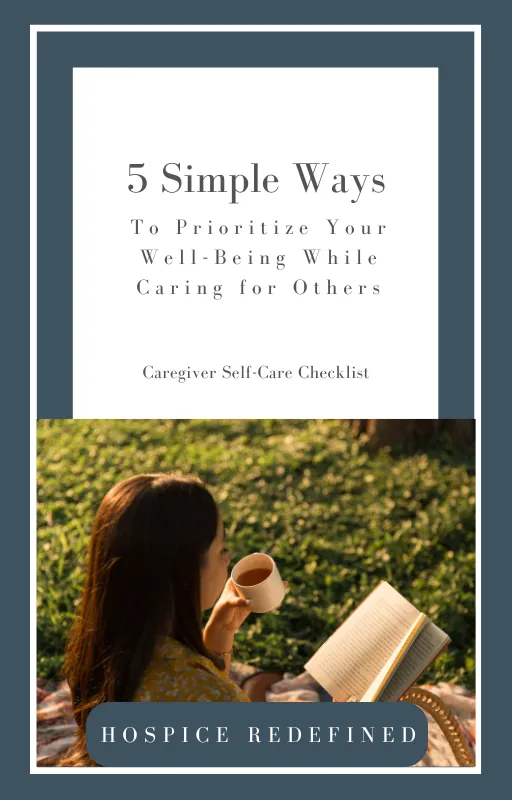
Redefined
Hospice
Your Guide to Understanding Hospice With Clarity and Compassion

Hospice
Redefined
Your Guide to Understanding Hospice With Clarity and Compassion

3 Simple Yet Powerful Ways to Support Your Body as a Caregiver
“When you care for the caregiver, you support the whole room.”
🎧 Listen on Apple Podcasts | Listen on Spotify
3 Simple Yet Powerful Ways to Support Your Body as a Caregiver
Plus a Bonus Tip That Might Be the Most Important One of All
Let’s face it—caregiving is exhausting. Whether you’re caring for a parent, partner, or loved one, there’s a good chance you’re constantly giving, often at the expense of your own needs.
I see it every day in hospice. I see it in my own family. And as a hospice nurse and functional nutrition counselor, I want to offer you three simple, doable things you can start today to support your energy, health, and sanity. Plus, I’ll share one bonus tip that could change everything.
Before we dive in, let me just say this: you do not have to do all of this at once. Just take one small piece and carry it with you. Let it support you.

Tip #1: Hydration—The Simplest Shift with the Biggest Payoff
When you’re running around taking care of someone else, drinking enough water is often the first thing to go.
But here’s the deal—your body is 60% water. That means when you’re not hydrated, everything from your energy to your brain fog to your digestion can be affected.
Even mild dehydration can make you feel more tired, irritable, and foggy. Not great when you’re already navigating so much.
So here’s what to do:
Keep a water bottle near you. Always.
Make it enjoyable—add lemon, cucumber, or even a few smashed berries.
Sip throughout the day—don’t wait until you’re thirsty.
If you’re visiting a caregiver, bring them water. Just place it next to them—it might be exactly what they needed but forgot to ask for.
Tip #2: Rest Whenever You Can—Even Just for 5 Minutes
I know, I know. “Rest” probably sounds laughable.
You’re juggling your loved one’s care, managing new responsibilities, and there’s always something more to do. I’ve been there. My mom was caring for my dad and I remember her surviving on naps, never getting a full night’s sleep unless one of us stepped in.
But the truth is, your body was designed to rest. You are not a machine.
If a nap feels out of reach, start here:
Sit down. Close your eyes. Take 3 deep breaths.
If your loved one naps, you nap.
If guilt shows up, gently remind yourself: This rest is how I keep going. This is how I care better.
You can even try writing down just one to three things on your to-do list each day. Not ten. Not fifteen. Just a few priorities. Then let yourself rest.
Tip #3: Add More Fruits and Vegetables (Not Perfection—Just Progress)

Nutrition often becomes whatever’s easiest when you’re caregiving. Maybe it’s toast for dinner. Maybe it’s snacks on the go.
Let’s shift that gently.
Start by adding in:
A piece of fruit with breakfast
A handful of baby carrots or nuts as a snack
A smoothie with some spinach thrown in (you probably won’t even taste it, I promise!)
Frozen veggies tossed into a soup or side dish
You don’t have to overhaul everything—just add in one extra fruit or veggie each day. Let your body feel the difference in energy, focus, and mood.
And if you’re visiting someone who’s caregiving? Bring them a little basket of nourishing snacks. It’s such a gift.
Bonus Tip (and Maybe the Most Important): Ask for Help
This one’s big. It’s also the hardest.
Asking for help doesn’t mean you’re not capable. It means you’re smart enough to know caregiving isn’t meant to be done alone.
It might look like:
Asking a family member to cover a shift
Calling a friend just to talk
Reaching out to your hospice team for more support
Support doesn’t always show up unless we ask for it. And you deserve to be supported.
Gentle Reminders for Your Week Ahead
You don’t need to change everything overnight. Maybe this week, you focus on water. Maybe next week, you explore those five-minute rest breaks. Or you pick up extra berries at the store and throw them into breakfast.
Little by little, you’ll notice how these small acts of care for you make it easier to show up for someone else.
And please, if you’re supporting a caregiver—bring the water, the healthy food, the encouragement. Hold space so they can rest. Sit with their loved one so they can step outside and take a deep breath.
Because when we care for the caregiver, we support everyone in the room.
💛 Want More Support?
Visit HospiceRedefined.com to grab your free Caregiver Self-Care Checklist—a PDF you can print and put on your fridge to remind you of the small things that make a big difference.
🎧 Listen to this episode on your favorite podcast platform:
And if you found this episode helpful, please forward it to someone who needs it. Or better yet, grab your phone, press play, and sit with them while they listen.
You’re not alone. We’re so proud of you for showing up.
Until next time,
Rachel
Written and produced by Rachel Carta, RN, Functional Nutrition Counselor & Life Coach
Listen
Episode 1:
Episode Title Goes Here
Episode 2:
Episode Title Goes Here
Episode 3:
Episode Title Goes Here
YOUR WELL-BEING MATTERS TOO
5 Simple Ways to Prioritize Your Well-Being
While Caring for Others
Click below to get instant access to the Caregiver Self-Care Checklist.


Your Host
Rachel is a hospice nurse, functional nutrition counselor, and life coach. As host of Hospice Redefined, she’s passionate about dispelling hospice misconceptions and empowering caregivers with knowledge and support. Her mission is to help families see hospice as an opportunity for comfort, dignity, and meaningful connection.
Rachel Carta, RN
HOST OF HOSPICE REDEFINED, AUTHOR, SPEAKER
SELINSGROVE, PA

Special Recurring Contributor
John is a social worker with more than 30 years of experience. He brings a wealth of knowledge, compassion, and empathy to our listeners.
John Myers, MSW
SOCIAL WORKER







